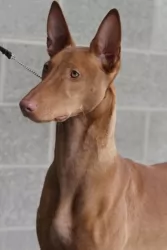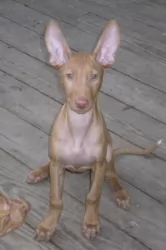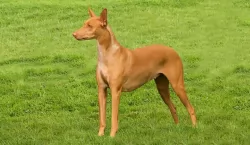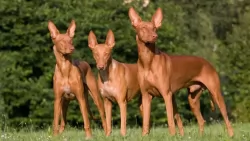 MyDogBreeds
MyDogBreeds Pharaoh Hound is originated from Malta but Brazilian Terrier is originated from Brazil. Pharaoh Hound may grow 23 cm / 10 inches higher than Brazilian Terrier. Pharaoh Hound may weigh 17 kg / 38 pounds more than Brazilian Terrier. Both Pharaoh Hound and Brazilian Terrier has same life span. Both Pharaoh Hound and Brazilian Terrier has almost same litter size. Both Pharaoh Hound and Brazilian Terrier requires Low maintenance.
Pharaoh Hound is originated from Malta but Brazilian Terrier is originated from Brazil. Pharaoh Hound may grow 23 cm / 10 inches higher than Brazilian Terrier. Pharaoh Hound may weigh 17 kg / 38 pounds more than Brazilian Terrier. Both Pharaoh Hound and Brazilian Terrier has same life span. Both Pharaoh Hound and Brazilian Terrier has almost same litter size. Both Pharaoh Hound and Brazilian Terrier requires Low maintenance.
 The Pharaoh Hound hails from Malta and is the national dog there. These dogs are rare and are looked upon as endangered. Because they are a primitive type dog, they enjoy good health.
The Pharaoh Hound hails from Malta and is the national dog there. These dogs are rare and are looked upon as endangered. Because they are a primitive type dog, they enjoy good health.
It has always been used as a hunting dog for rabbits. The dog has been recreated from mixing a combination of other breeds. It certainly seems to be an ancient dog breed, having existed for more than 2 000 years.
It is thought that the dog was imported to Malta by Phoenician traders. The dog has been classified as a member of the sighthound group, and arrived in England in the 1930s and to the USA in 1967. The breed was also officially recognized by the American Kennel Club in 1984.
 Though its exact origins are questioned it is known that the Brazillian Terrier was developed in Brazil and along with the Fila Brasileiro, are the only authentic Brazillian breeds. In the early 1800’s the Jack Russel Terrier, Fox Terrier, Chihuahuas and Miniature Pinschers were mixed to create the Brazillian Terrier. The Terrier breed was brought to Brazil by Europeans and there were probably both the Jack Russel and the Fox Terrier in the mix. Very popular within its own country the Brazillian Terrier is barely known outside Brazil. They were registered in 1973 even though they have been around in Brazil since the 1800’s. They are both single and pack hunting dogs. They chase and surround prey until the prey becomes too exhausted to run or fight. The Brazillian Terrier is larger than any European or North American Terrier. They are also less aggressive than other terrier types so that pack hunting became possible. They were built to work in the heat for long periods of time. Their stamina far surpassed other terriers as did their resistance to parasites and diseases.
Though its exact origins are questioned it is known that the Brazillian Terrier was developed in Brazil and along with the Fila Brasileiro, are the only authentic Brazillian breeds. In the early 1800’s the Jack Russel Terrier, Fox Terrier, Chihuahuas and Miniature Pinschers were mixed to create the Brazillian Terrier. The Terrier breed was brought to Brazil by Europeans and there were probably both the Jack Russel and the Fox Terrier in the mix. Very popular within its own country the Brazillian Terrier is barely known outside Brazil. They were registered in 1973 even though they have been around in Brazil since the 1800’s. They are both single and pack hunting dogs. They chase and surround prey until the prey becomes too exhausted to run or fight. The Brazillian Terrier is larger than any European or North American Terrier. They are also less aggressive than other terrier types so that pack hunting became possible. They were built to work in the heat for long periods of time. Their stamina far surpassed other terriers as did their resistance to parasites and diseases.
Many farmers and plantation owners came to values them for their ability to hunt down and eliminate vermin on the land and thus help with increased production of livestock and crops. They were so loved by the farmers and plantation owners that they began known as the “dog of the common people”. Yet it was not only the rural folks who valued this breed, but the people of the cities did as well. Because they were good ratters, a reasonable size, affectionate and loyal, many urban households sported a Brazillian Terrier. The breed spread throughout the country.
The Brazillian Terrier was kept mostly pure bred throughout its history but due to lack of pedigrees and paperwork it was not recognized by any kennel club unit 1973 when Brazillian breeders formed the Clube de Fox Paulistinha or CPF. They had a standard developed and created a stud book. By 1991 they were still not officially recognized but the CFP and the CBKC (Confederacio Brasilera de Cinofilia) began the process of establishing acceptable pedigrees and recognition of the breed. The FCI recognized the breed in 2007.
 The Pharoah Hound is an elegant looking dog standing at roughly between 53 and 63cm and weighing 18 to 27kg.
The Pharoah Hound is an elegant looking dog standing at roughly between 53 and 63cm and weighing 18 to 27kg.
They are sleek dogs without any bulkiness about them and the coat is tight fitting with short smooth hair. The coat is a tan or red color, the eyes bright and the color of amber. The ears are fairly large and erect and the long tail slim with sometimes a white tip. The skin can be thin so the dog can be sensitive to the cold.
The neck of the dog is long and lean, as are the legs. An interesting aspect with this dog is that when the dog becomes excited its ears and nose become bright pink.
Pharoah Hounds are calm dogs and they can live in the city or in the countryside. They love kids and will be a wonderful playmate for them. Once he has had a lot of exercise and play, he is the kind of dog that will settle down happily with his human family for some quiet time.
Just as with any other dog, he will require training and socialization to make him obedient and better behaved.
 The Brazillian Terrier is a small to medium sized dog with a white – tricolor (tan and black) coat. It has a narrow chest, a triangular rather flat skull, the tail is docked, folded, half pricked hears, and the body is well-balanced. Its legs are long and athletic, and the coat is very short and very fine. He has round eyes that can be green, blue, brown or gray. They are very much like the Jack Russel in temperament. His expression should reflect that temperament in its eagerness and alertness.
The Brazillian Terrier is a small to medium sized dog with a white – tricolor (tan and black) coat. It has a narrow chest, a triangular rather flat skull, the tail is docked, folded, half pricked hears, and the body is well-balanced. Its legs are long and athletic, and the coat is very short and very fine. He has round eyes that can be green, blue, brown or gray. They are very much like the Jack Russel in temperament. His expression should reflect that temperament in its eagerness and alertness.
 The Pharaoh Hound is quite interesting in a number of ways and he is independent, strong-willed and able to entertain and amuse himself.
The Pharaoh Hound is quite interesting in a number of ways and he is independent, strong-willed and able to entertain and amuse himself.
He loves to join in with the children and be part of their games. He’s intelligent and easily trained and he is also low maintenance.
While he’s not the most attractive dog to many people, others look at him as a true beauty. Whatever your opinion is, he will still make you a good family friend.
 The Brazillian Terrier is very much like his ancestor the Jack Russell. Like the JR Terrier he is friendly, intelligent, alert, playful, and loves to dig. They are courageous and fearless. They will obey but only if they know and believe you are really in charge. Otherwise they are intelligent enough to be very independent, determined and willful. At the same time, they are utterly loyal to their people. He needs a lot of toys but don’t let him live with other small animals. His hunting instincts may be the strongest of all terriers and he may harm small animals in the home. You have to teach him when to stop barking. Their love of play would consume your entire day if you let them. You should understand the terrier personality before you acquire a Brazillian Terrier.
The Brazillian Terrier is very much like his ancestor the Jack Russell. Like the JR Terrier he is friendly, intelligent, alert, playful, and loves to dig. They are courageous and fearless. They will obey but only if they know and believe you are really in charge. Otherwise they are intelligent enough to be very independent, determined and willful. At the same time, they are utterly loyal to their people. He needs a lot of toys but don’t let him live with other small animals. His hunting instincts may be the strongest of all terriers and he may harm small animals in the home. You have to teach him when to stop barking. Their love of play would consume your entire day if you let them. You should understand the terrier personality before you acquire a Brazillian Terrier.
 Pharaoh Hounds are uncommon outside of the Maltese Islands and with very little irresponsible breeding, these dogs are virtually free of genetic diseases. A common dog illness to look out for includes -
Pharaoh Hounds are uncommon outside of the Maltese Islands and with very little irresponsible breeding, these dogs are virtually free of genetic diseases. A common dog illness to look out for includes -
Your Pharaoh Hound can suffer from patella luxation, and in more severe cases it can be painful and even be disabling for a dog. This ailment comes about when the kneecap is dislocated from its normal position. You’ll find your dog lifting his hind leg quite a bit. Unfortunately this problem can lead to arthritis developing.
Other illnesses to look out for are bloat, cancer, skin allergies and ear infections.
 The breed is mostly healthy except for hunting accidents and a few generic issues they are susceptible to. This includes things like Dental and eye issues, the usual ear issues, liver issues, allergies, epilepsy and patellar luxation. However, they are more likely to have issues related to hunting than another of these predisposed conditions
The breed is mostly healthy except for hunting accidents and a few generic issues they are susceptible to. This includes things like Dental and eye issues, the usual ear issues, liver issues, allergies, epilepsy and patellar luxation. However, they are more likely to have issues related to hunting than another of these predisposed conditions
 The Pharaoh Hound’s short coat is easy to groom and it will require a brushing at least twice a week just to get rid of loose hairs.
The Pharaoh Hound’s short coat is easy to groom and it will require a brushing at least twice a week just to get rid of loose hairs.
At the same time trim his nails, check inside his ears for infection and look inside his mouth for any rotting teeth.
Your Pharaoh Hound is an active, energetic dog and he will need a good dose of exercise every day. Take him with you on your walks or allow him to join you with your hikes, jogging or cycling. At home involve him in some ball games.
How much any adult dog eats will depend on a number of factors such as size of dog, age and his activity levels.
You get some excellent dog kibble these days on the market but the idea is to choose one of the high quality ones which have minerals and vitamins in them. Home-made food is also good for your pet and this should be kept simple, consistent and nutritious.
Every now and then you can add in some boiled chicken, brown rice or pasta and sweet potato, carrots and spinach to the kibble. Some raw meat added in can also be of benefit to your dog’s health.
Stay away from spicy, exotic foods and keep your dog's food easy like suggested so as to avoid digestive problems
 This is still a working dog and a terrier at that. They are high energy, athletic dogs. Feed a high-quality food at the rate of 1 to 2 cups per day, split into 2 meals. Treat are good for training but if your Brazillian Terrier is not hunting or working in some way, stay away from too much food and treats as he can easily become obese.
This is still a working dog and a terrier at that. They are high energy, athletic dogs. Feed a high-quality food at the rate of 1 to 2 cups per day, split into 2 meals. Treat are good for training but if your Brazillian Terrier is not hunting or working in some way, stay away from too much food and treats as he can easily become obese.
As mentioned previously, the biggest concern with this breed is hunting accidents or injuries. Look out for ear and skin infections or allergies. For the most part this is a hardy, healthy breed.
A very energetic dog, the Brazillian Terrier like its ancestors has a need to work off that energy. Yes, he is an urban dog and can live in an apartment, but you better have a dog park or a competition or some place to hunt because his need for exercise cannot be answered by daily walks and running around an apartment. IF your Brazillian Terrier is not stimulated physically and mentally on a daily basis he will become destructive, hyperactive and very, very unhappy. Don’t just stick him in a yard and leave him either as terriers are known to dig and escape and he will too.
They excel at agility, flyball, obedience and confirmation. They love to chase things and they love to explore. Barn Hunt would also be a good game for them. They are very smart, so their physical exercise should be paired with mental stimulation.